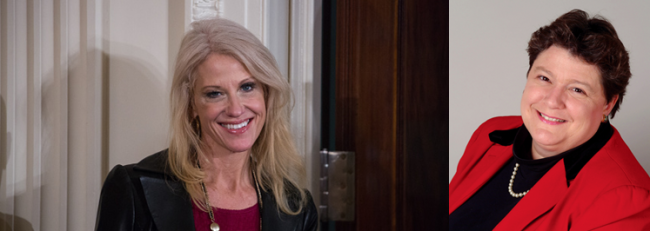You have /5 articles left.
Sign up for a free account or log in.

Kellyanne Conway and Patricia McGuire
Getty Images
Many college presidents avoid talking or writing about anything remotely political. They cite "institutional neutrality" and speak out only on a narrow set of policy issues, such as student aid, that directly relate to their institutions. Many presidents also demur if asked to criticize an alumnus, more so if that alumnus happens to be a donor.
But Patricia McGuire, president of Trinity Washington University since 1989, does not pull her punches. She is widely credited for shifting the university away from a traditional role of educating wealthy white women -- a market it was losing -- and toward a mission of educating low-income Washington women, including many black, Latino and immigrant students. Many alumnae were not initially sold on the shift, and McGuire had to fight for this vision of the college, one that is now widely praised.
In the early days of the Trump administration, McGuire has had much to say on Twitter about moves by the new president and his team that she finds dangerous and inconsistent with American values. But it was a blog post last week that now has people in higher education talking.
First McGuire used typically strong language to discuss concerns about truth and falsehoods in public life today.
"We Americans study the history of tyranny and exclaim, 'That’s terrible, but it would not happen here!' as we congratulate ourselves on the robust state of our democracy. The experience of the last few months now exposes this once-confident boast as terribly naive and perhaps even dangerous as a new administration indulges in a remarkable torrent of false and misleading statements as a basis for policy and action," she wrote. "The gravest lie we are grappling with at the present moment is the Trump Administration’s cruel and unreasonable war on immigrants -- mostly people who are black and brown, and Muslim -- Mexicans and refugees from central America, Syrian refugees, people from certain countries in the Middle East and Africa including Iran, Iraq, Sudan, Syria, Yemen, Libya and Somalia."
Further down in the piece, she criticized Kellyanne Conway, a top Trump aide and a Trinity alumna.
"Presidential Counselor Kellyanne Conway, Trinity Class of 1989, has played a large role in facilitating the manipulation of facts and encouraging the grave injustice being perpetrated by the Trump Administration’s war on immigrants among many other issues," McGruire wrote. "She is one of President Trump’s primary spokespersons, an almost daily figure on cable news shows. Some people admire her staunch advocacy for her client’s positions, and others applaud the fact that she was the first woman to manage a successful presidential campaign. But in fact, as is true of many of President Trump’s statements, her advocacy on his behalf is often at variance with the truth.
"Ms. Conway invented the now-infamous phrase 'alternative facts' to defend Trump’s claims about the size of crowds at his inauguration, a thinly veiled autocratic scheme to try to claim that the Trump inauguration drew the biggest crowd in history when, in fact, it was on the smaller side. Ms. Conway has been part of a team that thinks nothing of shaping and spreading a skein of lies as a means to secure power. Perhaps the 'Bowling Green Massacre' comment was truly a mistake, as she claims, but she repeated that canard on three different occasions as an explanation for why the travel ban, an executive order that clearly discriminates against Muslims, was necessary."
When The Washington Post called Conway to discuss the matter, she didn't pull her punches either.
“It’s a disappointment to have the president of the university lift up other Trinity graduates who have a casual relationship with the truth,” she said. (As an example, she cited Nancy Pelosi, Democratic leader in the House of Representatives.) She also noted that McGuire had never called her to ask her to explain her comments.
McGuire never hesitated to call her to ask for donations to Trinity, Conway added. She and her husband donated $50,000 to a 1999-2002 fund-raising campaign. "My money was good," Conway said. “I get better treatment from Robby Mook [Hillary Clinton's campaign manager] than I do from the president of the university I attended.”
Others quoted by the Post were also critical of McGuire. “To me, university leadership has felt enormously partisan…” Frederick Hess, director of education policy studies at the American Enterprise Institute, told the newspaper. “That factors into seeing this as cheap partisan thuggery rather than any serious commitment to robust civic debate.”
That comment prompted a series of tweets by Kevin Carey, who directs the education policy program at New America.
In subsequent tweets, he urged Hess and others to consider "the history of Catholic women's orders and social justice," and the role of the sisters who founded and for many years led Trinity. (Carey has written with admiration of Trinity in the past, such as in this article in The Washington Monthly.)
Just how strongly presidents should speak out on Trump administration actions has been heatedly debated. There is no consensus among college presidents, but the majority are far from where McGuire is. One exception is Macalester College's president, Brian Rosenberg, who went much further than other presidents in criticizing President Trump's executive order (currently being revised after courts blocked it) barring travel to the United States for people from seven Muslim-majority nations. Rosenberg called the order "cowardly and cruel." Many presidents have spoken out against that executive order, and some have used strong language, but many have not. Both Rosenberg and McGuire also have been presidents at their institutions longer than many of their counterparts elsewhere.
In an interview with Inside Higher Ed, McGuire said she wished more presidents spoke out with more force on a range of issues, although she acknowledged that this is difficult for some in public higher education.
Like other presidents, McGuire has criticized the Trump executive order. She said she viewed that as part of a president's role of "protecting my students."
She also said she cared deeply about all students at Trinity feeling free to disagree with her. Polling on campus during the campaign suggested that hardly anyone there backed Trump, but McGuire said all views were welcome. "We do have conservative alums, some of whom have written in recent days," McGuire said. But far more alumnae have been asking (prior to the blog post) why she wasn't speaking out about Conway. Many have noted the value of Trinity's honor code and its commitment to truthfulness. McGuire wrote in her blog post:
"The Honor Code says we must not look away from lies, that we must confront them and tell the truth as a matter of justice for the community. The truth of the present moment in our country is that the authoritarian impulse will prevail unless people of courage and integrity confront the outright lies and shady manipulation of facts. Social justice says that our first and most important duty is to be of service to those who are suffering and in need, to be our sister’s keeper, to stand in solidarity with all those who need our support and capacity to stand up to injustice. Justice demands that we be advocates for the truth."
As to Conway's suggestion that McGuire should have reached in personally before voicing concerns in public, McGuire said that Conway is a public figure, sharing views about other people on television on a daily basis, and so is subject to criticism in public.
Where McGuire said that the discussion on social media about her comments has been incorrect was in suggesting that she was engaged with political issues that somehow don't relate to her role as an academic leader. She also said that she differs with Pelosi on the Democratic leader's support for abortion rights, which runs counter to the Roman Catholic teachings embraced by Trinity.
Of her dispute with Conway, she said, "This is not a political cat fight," but is about "a core value" of higher education -- the truth.
"The issue with truth and truth-telling is central in all we do. If we academics don't stand for truth, what's the purpose of what we do?" McGuire asked. "I don't think it's outside our responsibility to stand up for truth and freedom. Fundamental democratic values are at stake. Academic freedom is at stake."
Asked if she would speak out in the same way if leading a college with a different study body, say wealthier and more conservative, McGuire said she couldn't really know. "I'm not sure I would ever be picked to be the president of that kind of college, nor would I seek it."




